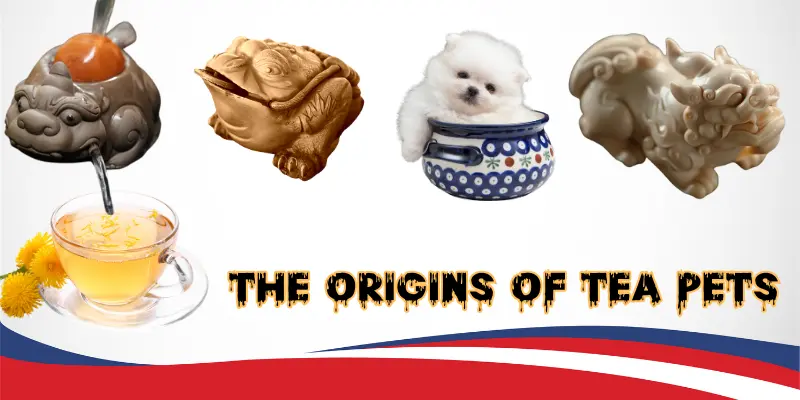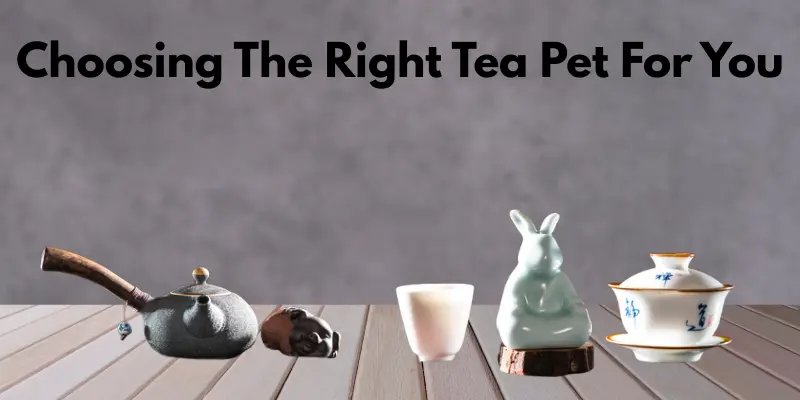Tea Pets – History, Role & How To Care For Them
Published: 18 May 2025
Tea pets are small, charming clay figurines that sit beside your teapot during tea time. These little companions not only add beauty to your tea setup but also carry rich traditions and stories from ancient Chinese culture. Watching a tea pet “come to life” as it absorbs tea over time makes every cup even more special.
Table of Contents
The Origins Of Tea Pets
The Origins of Tea Pets go back many centuries in China, during the Ming Dynasty. Tea lovers made small clay figures to keep near their tea pots.

These little pets were believed to bring good luck and happiness. Over time, they became part of the tea ceremony, adding fun and meaning to the peaceful tea time. Today, tea pets still carry the stories and traditions of the past with every cup of tea.
History Of Tea Pets
Tea pets began long ago in China, during the Ming Dynasty. Tea lovers made small clay figures to keep them company during tea time. Made from special Yixing clay, these tea pets slowly soaked up tea, changing colour over time. They became symbols of luck and friendship and are still loved by tea fans today.
Craftsmanship and Materials, How Tea Pets Are Made
Tea pets are more than just pretty decorations they are carefully made by skilled hands using special materials. Each tea pet tells a story through its shape, texture, and colour. Here’s how they are made and what makes them so special:
1. Yixing Clay The Heart of a Tea Pet
- Tea pets are usually made from Yixing clay, also known as Zisha clay.
- This clay comes from Yixing, China, and is famous for its porous texture.
- It absorbs tea over time, which gives the tea pet a shiny and rich look.
2. Handmade by Artists
- Most tea pets are handcrafted, not made by machines.
- Artists use tools to shape, carve, and smooth every little detail.
- This makes each tea pet unique, even if it looks like another.
3. Designs with Meaning
- Common shapes include dragons, frogs, pigs, and monks.
- Every shape has a special meaning like wealth, wisdom, or protection.
- The design is carefully chosen based on tradition and symbolism.
4. Firing the Clay
- After shaping, tea pets are fired in a kiln at high temperatures.
- This step makes them strong and long-lasting.
- The heat also brings out the natural colours of the clay.
5. No Paint, Just Tea
- True tea pets are never painted.
- They change color and shine naturally as they drink tea over time.
- This is why people say tea pets have “a life of their own.”
The Role of Tea Pets in Tea Ceremonies
Tea pets are not just decorations they are part of the peaceful and respectful world of tea. During a traditional tea ceremony, tea pets add beauty, meaning, and even a little bit of fun. Here’s how they are used:
- Bringing Good Luck
- Welcoming Peace and Calm
- Part of the Tea Ritual
- Tracking Time and Use
- Creating Joy and Conversation
Modern-Day Tea Pets, Tradition Meets Today
Tea pets may come from ancient traditions, but they are still loved in modern times with new styles and creative ideas. Today’s tea lovers are finding fun and personal ways to enjoy these little tea companions. Here’s how tea pets are being used in today’s world:
- Creative New Designs
- Tea Pets on Social Media
- Collecting as a Hobby
- Used for Mindfulness and Relaxation
- Eco-Friendly and Handmade Choices
Choosing The Right Tea Pet For You
Picking a tea pet is like choosing a little friend to join your tea journey. It’s not just about how it looks it’s about what it means to you, how it fits your tea time, and how it makes you feel. Here’s how to find the perfect tea pet for your style:

1. Follow Your Heart
- Choose a tea pet that makes you smile or feel calm when you see it.
- Whether it’s a frog, dragon, pig, or a funny little figure go with what speaks to you.
2. Understand the Meaning
Each tea pet has its own symbolism:
- Frog: wealth and luck
- Dragon: power and wisdom
- Elephant: peace and strength
- Laughing Monk: joy and humor
Pick one that matches what you want in life or your tea moments.
3. Check the Material
- Traditional tea pets are made of Yixing clay, which absorbs tea and gets better with time.
- Make sure the pet is unglazed so it can soak in the tea properly.
4. Feel the Craftsmanship
- Look for handmade tea pets they are often more detailed and full of character.
- A well-made tea pet will feel smooth and solid in your hand, not cheap or rough.
5. Pick the Right Size
- If your tea table is small, choose a tiny tea pet.
- For bigger setups, a larger or more detailed pet can be the centerpiece.
6. Match Your Tea Style
- If you love quiet, peaceful tea time, choose a calm looking pet like a turtle or monk.
- If you like playful tea time with friends, pick something fun maybe one that squirts water!
Advantages and Disadvantages of Tea Pets
Like everything, tea pets have both good and not-so-good sides. Knowing the advantages and disadvantages can help you decide if a tea pet is right for your tea time.
| Pros |
|---|
|
| Cons |
|---|
|
FAQs About Tea Pets
Got questions about tea pets? Here are clear answers to help you learn more about these charming tea companions and how to care for them.
Tea pets are small clay figurines used during tea ceremonies. They sit next to your teacup and are “fed” with tea to bring good luck and add fun to tea time.
Most tea pets are made from Yixing clay because it absorbs tea, changes colour, and becomes shiny over time, making each tea pet unique.
You take care of a tea pet by regularly pouring leftover tea over it and cleaning it gently with water. Avoid soap or harsh chemicals.
Yes, because many tea pets are handmade from clay, they can be fragile. Handle them with care to avoid chipping or breaking.
Yes, different shapes like frogs, dragons, or turtles have their own meanings, such as luck, wisdom, or peace.
Yes, you can pour any kind of tea over your tea pet. Some teas may change the pet’s colour faster than others.
Tea pets originated in China but are now popular worldwide among tea lovers and collectors.
It can take several months to years for a tea pet to develop a shiny and darker color, depending on how often you “feed” it tea.
Conclusion
Tea pets are more than just little clay figures they bring life, luck, and joy to every tea moment. Caring for them creates a special bond that grows over time. Whether you’re new or an expert, a tea pet adds calm and beauty to your tea ritual. Try having one and enjoy the magic it brings to your cup.
Written by Pets Osrs – Complete SEO Expert

- Be Respectful
- Stay Relevant
- Stay Positive
- True Feedback
- Encourage Discussion
- Avoid Spamming
- No Fake News
- Don't Copy-Paste
- No Personal Attacks

- Be Respectful
- Stay Relevant
- Stay Positive
- True Feedback
- Encourage Discussion
- Avoid Spamming
- No Fake News
- Don't Copy-Paste
- No Personal Attacks





